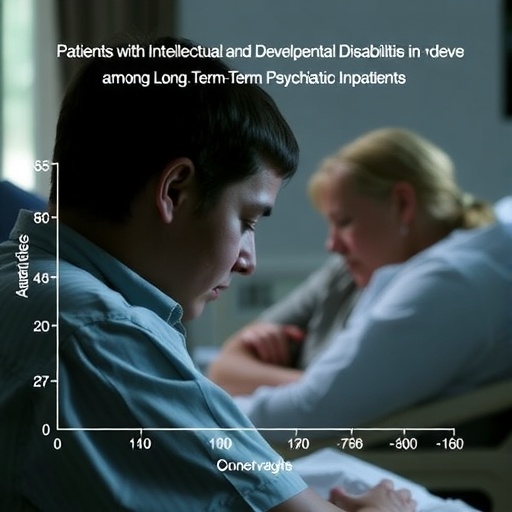In a groundbreaking population-based study published in the September 2025 issue of The Canadian Journal of Psychiatry, researchers from the Institute for Clinical Evaluative Sciences (ICES) and the Centre for Addiction and Mental Health (CAMH) have unveiled critical insights into the prolonged hospitalization of individuals with intellectual and developmental disabilities (IDD) in Ontario’s mental health system. This comprehensive observational study reveals that patients with IDD represent a disproportionately large segment of those who have remained in psychiatric inpatient beds for over a year—a finding that spotlights significant unmet clinical and social needs within this vulnerable population.
The study analyzed 1,466 patients occupying Ontario’s mental health beds for durations exceeding one year as of September 30, 2023. Astonishingly, 322 of these patients were identified as having IDD, constituting more than one in five long-stay psychiatric inpatients. This finding alone challenges existing paradigms in mental health care delivery, underscoring a pressing need for tailored interventions that address the unique cognitive, behavioral, and psychosocial complexities faced by this group.
Compared to their non-IDD counterparts, individuals with IDD admitted for prolonged periods were notably younger and more likely to receive diagnoses of psychotic disorders, highlighting a differential clinical profile. Furthermore, the study unveiled that nearly 40% of these long-term inpatients were autistic, indicating a significant intersection between autism spectrum disorders and chronic psychiatric institutionalization. This intersectionality calls for nuanced, cross-disciplinary approaches encompassing neurodevelopmental, psychiatric, and rehabilitative expertise.
A disturbing component of the study’s findings was the increased likelihood of restrictive interventions—such as physical restraint and seclusion—used on patients with IDD during their hospitalization. Despite these elevated risks, only about five percent of this population had access to specialized inpatient units designed explicitly for individuals with intellectual and developmental disabilities. The vast majority were placed in general psychiatric wards where healthcare providers frequently lack specialized training to meet their complex needs, raising profound concerns about the adequacy and appropriateness of current care settings.
Social isolation emerged as another critical barrier to discharge, with over half of the long-stay IDD patients lacking sufficient familial or community supports. This deficiency severely hampers successful transitions from hospital to community living, creating a cycle of extended institutionalization. The researchers suggest that the convergence of cognitive impairments, limited self-care abilities, and sparse social networks traps these patients in inpatient units ill-equipped to foster recovery or reintegration.
Addressing these systemic deficiencies, the authors advocate for an urgent expansion of both hospital- and community-based specialized services. In hospital settings, there is a clear imperative to boost capacity and enhance the training of staff in IDD-specific care competencies. Equally vital is the development of robust outpatient mental health programs, as well as stable housing and disability-related supports that can facilitate timely discharge and reduce avoidable readmissions.
The study reflects on the principles delineated in the Ontario Practice Guidance for transitioning patients with dual diagnoses from hospital to home. Advocates like Avra Selick, lead author and scientist at CAMH, emphasize that existing frameworks provide effective blueprints for care but require systemic investment and collaborative implementation across health and social services sectors to achieve transformative change. The continued reliance on generalized psychiatric care models fails to capture and address the complexity inherent in this group’s needs.
From a public health standpoint, these findings signal substantial health disparities affecting people with IDD within the mental health system. This vulnerable population experiences both a higher likelihood of severe mental illness and suboptimal support, factors which compound morbidity, personal distress, and societal costs. Strategies to reduce stigmatization and improve clinical outcomes demand integrated care models centered on personhood, autonomy, and community inclusion.
Yona Lunsky, ICES scientist and Director of the Azrieli Centre at CAMH, stresses that the issue is not only one of inadequate hospital care but also the upstream social determinants that precipitate lengthy admissions. Factors such as lack of access to outpatient supports, housing insecurity, and fragmented service coordination serve as underlying drivers of prolonged hospitalization, which in turn perpetuates reliance on restrictive and resource-intensive institutional environments.
The study’s meticulous methodology involved the linkage of administrative health data across Ontario’s health system, enabling researchers to accurately characterize the population and contextualize inpatient experiences. This data-driven approach offers a robust foundation for informing policy change and resource allocation aimed at optimizing mental health services for people with IDD.
In acknowledging the limitations of current inpatient facilities, the authors underscore the importance of creating specialized units equipped both physically and intellectually to respond to the distinct needs of IDD patients. This includes training healthcare providers in the neurodevelopmental and cognitive aspects of care, ensuring environments that minimize triggers for distress and behavioral crises, and implementing support plans that prioritize functional skills and social integration.
The findings and recommendations from this pivotal study have profound implications for stakeholders across the healthcare continuum—policy makers, clinicians, community organizations, and families alike. With growing awareness and coordinated action, the mental health system can evolve to uphold the dignity, rights, and quality of life of adults with intellectual and developmental disabilities, reducing the burden of protracted hospital stays and enhancing pathways to recovery and community living.
Subject of Research: People
Article Title: Long-stay psychiatric inpatients with and without intellectual and developmental disabilities: an Ontario population-based study
News Publication Date: 29-Sep-2025
Web References: http://dx.doi.org/10.1177/07067437251380731
Keywords: Health disparity, Mental health facilities, Hospitals, Health care costs, Psychiatry




